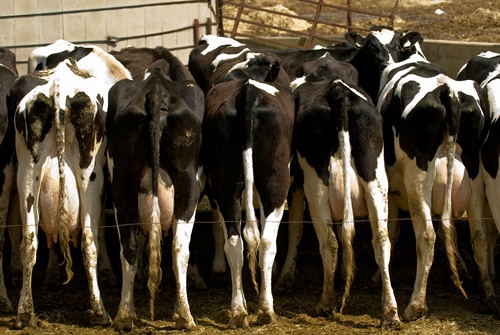18 February 2016. The Middle East respiratory syndrome coronavirus, or MERS virus, is spreading throughout the Middle East and Asia, largely through person-to-person contacts, and with a fatality rate of 36 percent. A research team at University of Maryland, with colleagues from industry and government labs, developed antibodies from genetically-engineered cattle that protect lab mice from the MERS virus, with their results appearing in yesterday’s (17 February) issue of Science Translational Medicine; paid subscription required.
The MERS virus was first spotted in 2012 in Saudi Arabia, and is believed to originally spread from camels. Symptoms often include shortness of breath, cough, and fever, but cases of pneumonia, organ failure, and gastrointestinal symptoms also developed. World Health Organization reports 1,638 cases of MERS in 26 countries in the Middle East and Asia, including Korea and Thailand, leading to 587 deaths. So far no treatments or preventive vaccines are available.
A team from University of Maryland in Baltimore, led by immunologist Matthew Frieman, with associates from the companies SAB Biotherapeutics and Novavax, and Navy Medical Research Center in Silver Spring, Maryland reported on development of new antibodies which can be the basis for treatments or vaccines against the MERS virus. The group aimed to generate the antibodies from immunoglobulin G, found in blood and other bodily fluids, but faced a problem with natural sources of immunoglobulin G that can produce only limited quantities.
To produce these antibodies in the desired quantities, the researchers turned to SAB Biotherapeutics in Sioux Falls, South Dakota. The company produces human antibodies from genetically engineered cattle, with a technology that prevents harm to the animals, which are plentiful and well-studied in agriculture. And because of their large size, cattle can produce large quantities of the desired antibodies.
The SAB cattle in this case were genetically modified to carry an artificial human chromosome containing immunoglobulin genes. The cattle produced human polyclonal antibodies, those addressing multiple targets, that generated a strong immune response. Initial lab tests showed the antibodies destroying various strains of the MERS viruses in cell cultures.
The team then injected the antibodies into lab mice 12 hours before, or 24 hours and 48 hours after infection with the MERS virus. The results show the antibodies lowered MERS virus concentrations in the mice near or below levels of detection.
“This is important,” says Frieman in a university statement, “not only because it gives us a potential way to attack MERS, but also because it provides evidence that using these transgenic cows can rapidly produce therapeutics.” The next step, say the researchers, is development of treatments or vaccines, beginning with safety trials in the next 3 to 6 months.
The MERS virus is a coronavirus, similar to severe acute respiratory syndrome or SARS, which had an outbreak in Asia in 2003 and spread to North America, South America, and Europe. The researchers believe the technology for quickly generating MERS antibodies could also be applied to SARS and other coronaviruses.
Read more:
- Zika Virus Genome Sequenced
- Engineered Viruses Harnessed to Fight Bacteria
- Virus Particles Rebuilt to Boost Immunotherapies
- Antibodies Isolated for Chikungunya Virus
- Chikungunya Virus Antibody Isolated, Tested
* * *


 RSS - Posts
RSS - Posts
You must be logged in to post a comment.